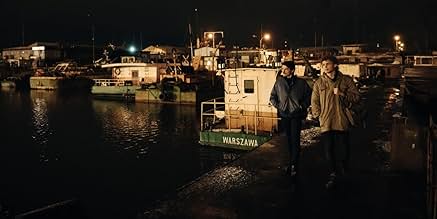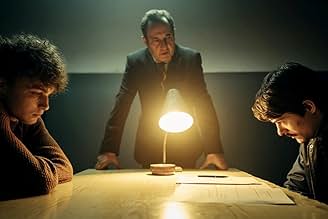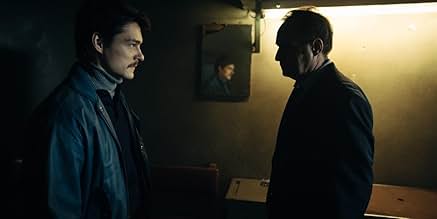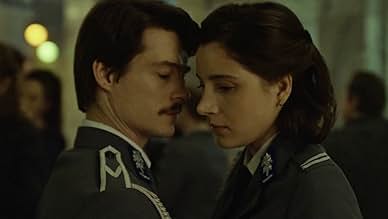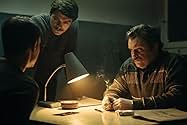IMDb रेटिंग
6.8/10
4.6 हज़ार
आपकी रेटिंग
अपनी भाषा में प्लॉट जोड़ेंPoland, 1985: Not satisfied with the result of a murder investigation, a young officer in communist Warsaw sets out on his own to discover the truth.Poland, 1985: Not satisfied with the result of a murder investigation, a young officer in communist Warsaw sets out on his own to discover the truth.Poland, 1985: Not satisfied with the result of a murder investigation, a young officer in communist Warsaw sets out on his own to discover the truth.
- पुरस्कार
- 4 जीत और कुल 2 नामांकन
कहानी
क्या आपको पता है
- साउंडट्रैकVoyage
by Brian Bennett
फीचर्ड रिव्यू
Summary
What appeared to be a Polish version of Cruising at the beginning is definitely not. It is a successful neo noir, controversial due to its subject matter for a Polish fiction, which recounts a police investigation into a period during which thousands of homosexuals and heterosexuals related to them were persecuted, mistreated, booked and sometimes compulsively detained. This is another of those films that strongly recreates that oppressive period climate, but also everyday "behind the iron curtain".
Review:
During the 1980s, while the Polish police and secret service carried out Operation or Action Jacinto, the young detective Robert (Tomasz Zietek, with an air of Polish Alain Delon) faces the investigation, as an undercover agent, of a murder in the underground gay community in Warsaw. Despite the rapid "solving" of the case under pressure from the SB (Polish intelligence and secret police, in which his own father is a colonel), Robert insists on carrying out the investigation and will do so for more than one reason.
What appeared to be a Polish version of Cruising at the beginning, is definitely not. Piotr Domalewski's film is a neo noir in which Robert's research poses challenges to the system that are later enhanced by more personal ones that are added. It is controversial for a Polish fiction to relate a police investigation referring to a period during which thousands of homosexuals were registered in a compulsive way from raids in a framework of denunciation so expensive to Stalinism and police brutality and that gave rise to all kinds of extortion. In other words, Operation Jacinto appears as the background of the investigation and not as the plot axis of the film. Perhaps for this reason, his denunciation is more powerful since he paints a whole period painting.
This is another of those films that strongly recreates that period climate "behind the iron curtain." The staging uses a photograph and a successful eighties soundtrack and the police and personal intrigues of the detective (although they contain some predictable elements) are very well concocted and carried out, supported by the acting solvency to which we are accustomed to Polish fictions.
What appeared to be a Polish version of Cruising at the beginning is definitely not. It is a successful neo noir, controversial due to its subject matter for a Polish fiction, which recounts a police investigation into a period during which thousands of homosexuals and heterosexuals related to them were persecuted, mistreated, booked and sometimes compulsively detained. This is another of those films that strongly recreates that oppressive period climate, but also everyday "behind the iron curtain".
Review:
During the 1980s, while the Polish police and secret service carried out Operation or Action Jacinto, the young detective Robert (Tomasz Zietek, with an air of Polish Alain Delon) faces the investigation, as an undercover agent, of a murder in the underground gay community in Warsaw. Despite the rapid "solving" of the case under pressure from the SB (Polish intelligence and secret police, in which his own father is a colonel), Robert insists on carrying out the investigation and will do so for more than one reason.
What appeared to be a Polish version of Cruising at the beginning, is definitely not. Piotr Domalewski's film is a neo noir in which Robert's research poses challenges to the system that are later enhanced by more personal ones that are added. It is controversial for a Polish fiction to relate a police investigation referring to a period during which thousands of homosexuals were registered in a compulsive way from raids in a framework of denunciation so expensive to Stalinism and police brutality and that gave rise to all kinds of extortion. In other words, Operation Jacinto appears as the background of the investigation and not as the plot axis of the film. Perhaps for this reason, his denunciation is more powerful since he paints a whole period painting.
This is another of those films that strongly recreates that period climate "behind the iron curtain." The staging uses a photograph and a successful eighties soundtrack and the police and personal intrigues of the detective (although they contain some predictable elements) are very well concocted and carried out, supported by the acting solvency to which we are accustomed to Polish fictions.
टॉप पसंद
रेटिंग देने के लिए साइन-इन करें और वैयक्तिकृत सुझावों के लिए वॉचलिस्ट करें
- How long is Operation Hyacinth?Alexa द्वारा संचालित
विवरण
- चलने की अवधि1 घंटा 52 मिनट
- रंग
- ध्वनि मिश्रण
- पक्ष अनुपात
- 2.35 : 1
इस पेज में योगदान दें
किसी बदलाव का सुझाव दें या अनुपलब्ध कॉन्टेंट जोड़ें



